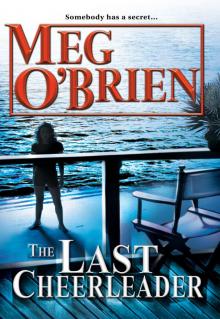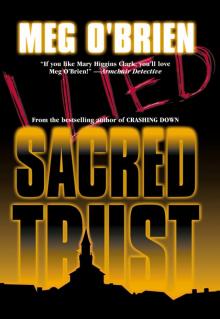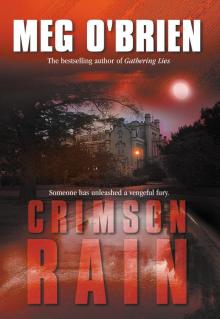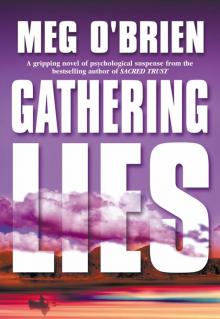- Home
- Meg O'Brien
Gathering Lies Page 3
Gathering Lies Read online
Page 3
It was then that we rose as one and strode around the divider that separated us from the bar. The bartender saw us coming, and moved away as if sensing trouble. There were no other patrons in McCoy’s at that time, and maybe it should have occurred to me to be afraid. But I wasn’t accustomed to drinking much, and I’d had two glasses of wine.
I grabbed Mike Murty by the arm and swung him around. “You son of a bitch!” I said. “You sick, worthless piece of crap!”
He slid off the stool and hovered over me, all six feet of him. With his thumbs in his belt and his feet planted wide, he laughed. The other three stood, too, surrounding Murty and me.
“Move along, little lady,” one of them said. It was Al Garben, a weasily guy with a mustache that didn’t quite hide a mean mouth.
J.P. pushed her way between them and me. Though she was only five-four, she stood toe to toe with them, her blue eyes blazing. “She’s right. You always have been sick bastards.”
Jake Suder laughed. “You got a problem with us, J.P.?” He stuck out a hand that was reddish and cracked, chucking J.P. under the chin. She knocked it away—but not before I remembered Lonnie Mae telling me about that hand, and the things it had done to her.
“Enjoy your drinks,” I said angrily. “There won’t be any where you’re going.”
Murty laughed again. “We’re not going anywhere, bitch. Unless, of course, you’re inviting us to your place?”
They all laughed, stepping forward and closing in on us. “That’s right,” Al said. “Maybe we’ll just stop by one of these nights. You know—a routine check, to see if you’re all right.”
Tad Sanders, the youngest one, grinned. “Maybe we’ll find that she’s more than all right. Maybe we’ll find that she’s real, real good.”
He leaned so close, I could smell the beer on his breath and see the peach fuzz on his chin. Not much more than twenty-two, he already had the look in his eyes of a predator.
J.P. put a palm against his chest, like a crossing guard. “Get back, asshole. All of you get back.”
“You think you scare anybody?” Al Garben taunted. “Little yellow-haired thing like you?”
“You’d better be scared,” I said, not even thinking as words tumbled from my wine-loosened tongue. “I have enough evidence to put every one of you away for good.”
“You’ve got evidence, bitch?” Murty laughed. “Not by a long shot.”
“Believe it,” I said. “Lonnie Mae gave me all I needed before she died. And you’re not getting away with it—not the rape, or her murder.”
J.P. flashed me a warning. I saw it in her eyes, just before I saw the threat in Mike Murty’s. J.P. grabbed my arm and pulled me away.
“Let’s get out of here,” she said. “C’mon, Sarah. You’ve had too much to drink. Let’s go.”
“You’re right,” I agreed, slurring the words a bit. “I don’t know what the hell I’m talking about. Anyway, I need a shower, to wash the filth away.”
We had to get our coats, and when we rounded the room divider again to go out the front door, I saw that the Five were having a serious conclave at the bar. They weren’t laughing anymore.
I should have felt a small sense of victory. But even without J.P.’s warning, I knew I’d said far too much.
Late that night, I tried to throw a net of protection around myself by calling Mike Murty at home. I told him I did, in fact, have evidence that he and the others had raped Lonnie Mae. I said the evidence was safe with someone unknown to him, and that if anything happened to me, it would go directly to someone in authority outside the Seattle PD. I told him that agency would nail them for the rape, Lonnie’s murder, and my death, as well. Then I closed with the argument that the Five’s best chance was to throw themselves on the mercy of the court—and that they’d better make sure I stayed alive to see them there.
I thought this would stop them. At the very least, I hoped it might buy me some time.
But that’s when the Seattle Five came after me.
Let me be clear. Most Seattle cops are good people, doing jobs they love and are proud of. Early in my career as a public defender, however, I’d acquired a reputation with even the good ones. To put as nice a slant as possible on it, they loathed me. I was the one who got people off after the cops worked their asses off tracking them down, taking them in, filling out paperwork, testifying in court. I didn’t mind their griping about me. It got me on the nightly news, and if that could in some way help a client, I was all for it. I dressed in snappy clothes for court, and to draw even more attention, I deliberately wore my thick blond hair in a loose, flowing style I was told was sexy.
Actually, Ian’s the one who told me my hair was sexy, even to the point of using it in our foreplay. One Fourth of July night we lay naked on my bed, I and Seattle’s top-ranking police detective, and watched the Space Needle fireworks from my window. Almost absentmindedly, Ian stroked my hair against himself, over and over till he was fully aroused, reaching climax just as the final burst of fireworks spilled from Seattle’s best-known phallic symbol. I recall getting into the spirit of things, though I never told him, during or after, how uncomfortable the position had been. In those days I’d have done anything for Ian, put myself in discomfort, even danger. I loved him with nearly my entire heart, leaving no room for anything else but the law.
Ironically, it was the law that came between us. Ian was a dedicated Seattle cop who spent long days putting evidence together to bring my clients into court. He had a hard time accepting that I had a job to do, and that I took pride in doing it.
It didn’t help matters that some of the accused I managed to get off weren’t innocent. That’s the thing about DNA—it can be used, if one knows how to present it in court, to free the guilty as well. And a lawyer’s job is to defend her client, innocent or not.
Law, I learned, has a way of wearing one’s purity down.
So Ian and I would argue about my work, and at first it was fun—something we did as part of foreplay, to get us excited. Later, it became something I dreaded.
“If the jury doesn’t understand DNA when the prosecutor rams it down their throats, over and over for hours till they become benumbed, it’s not my fault!” I’d argue, my voice shaking because I wanted more than anything to get the argument over with and get back to where we were “one.”
“You keep it going!” he would shout back. “You know exactly what you’re doing, and if the jury gets bored and doesn’t even listen, it’s your fault, not the prosecutor’s. You plan it that way. You weave a damned spell in the courtroom, and no one can see beyond it.”
He once went so far as to say that if I loved him, I would go do something else for a living—like mow lawns.
I couldn’t believe he was serious, and perhaps he was not. Ian, a linebacker type with red hair and an Irish temper, had a way of flying off the handle and saying things he didn’t mean. Later, he’d apologize, and things would go back to the way they had been. Until next time.
One night last January, however—two nights after I’d called Mike Murty and threatened him with Lonnie Mae’s evidence—Ian didn’t show for dinner. When I finally reached him late that night, he said he’d been busy. He didn’t know when he’d have time to see me again.
The next day, three uniform cops raided my apartment while I was out. A judge I barely knew had given them a warrant based on a flimsy tip the cops said they had received. They “found” crack cocaine and miscellaneous drug paraphernalia in my bedroom closet.
I do not use drugs, and never have.
I was arrested coming out of a courtroom, a moment I’ll never forget if I live to be older than sin. The charge was possession of illegal drugs with intent to sell, a felony, and after the usual delays and continuances, I didn’t expect my trial to go forward until early December. I walked through all these procedures like a zombie, in fear and disbelief.
The next day I made bail but lost my job, and for a brief time I fell into a depression. My only
comfort was that they hadn’t found Lonnie Mae’s evidence when they planted those drugs. I’d taken it from my trunk, after we left McCoy’s, and had given it to J.P. to put in a safe place.
I was too afraid now, though, to hand it over to anyone—even Ivy O’Day. It was the DA’s office, after all, that had pressed charges against me. Had Ivy told someone about my visit to her? The wrong someone? Had the cops, in fact, been searching for the evidence at the same time they planted those drugs?
Depression mingled with fear. Then, one day I woke up angry. From that morning on, my days were consumed with thoughts of how best to destroy the Seattle Five.
The next day, I walked over to Seattle Mystery Bookshop. Between talking with Bill Farley and looking through volumes on the shelves, I formulated a plan to write a book blasting the justice system in general, and crooked police in particular. Bill was all for it.
“It’s a bestseller in the making,” he told me, his white hair gleaming under the store’s light. “Especially with you being a lawyer. It’ll put you on talk shows, maybe even Larry King Live. You can get your story out that way.”
I wanted my story out, not just for myself, but for Lonnie Mae Brown. I still hadn’t heard from Ivy O’Day, and no charges had been filed against the Seattle Five. Lonnie Mae’s stockings remained in their plastic bag in a safe in the office of J.P.’s accountant, where she’d put them the night I handed them to her. After the confrontation with the Five in McCoy’s, she was afraid they’d search her office, and she hid the stockings in a brown envelope with old tax forms she gave to her accountant for storage.
As for me, as the weeks went by I was growing more and more frustrated and less and less willing to depend on justice taking its course. Lonnie Mae might still have been alive if the system put monsters like those cops in jail, instead of either ignoring the complaints against them, or letting them out on bail. And Lonnie was by no means an isolated case. Time after time, over the years, I’d seen it happen—rapists, murderers, child molesters given light sentences, only to be released from prison and kill, rape and molest again.
That I had defended some of them became an issue that confused me, leaving me sleepless and worn. My faith in jurisprudence—my vision of what the rule of law required—was nearly gone by this time, a state of mind at least partially responsible for what happened later, at Thornberry.
So I bought a new laser printer and reams of paper. By this time I was living here at my parents’ house, and one morning I took a cup of strong, hot Fidalgo coffee to my father’s desk, sat at my computer and began. After several awkward attempts, piling up pages by the hundreds in the trash can, I found myself working twelve, fourteen, even eighteen hours a day on this, my first book, Just Rewards. It became more important than anything I’d ever done, and the obsessive drive that had seen me through law school carried me now into this new world of writing, with that “fire in the belly” writers talk about.
Then, in early March, six weeks after my arrest, Timothea’s invitation came to spend the month of April at Thornberry. I readily agreed. Except for telling her story in my book, there seemed to be nothing more I could do for Lonnie Mae at that time. The scandal in the papers about the Five had, against all my hopes, died down to a mere dribble, and I’d grown less and less certain that the DA’s office would ever charge them. A call to Ivy had confirmed that opinion. She had been clipped, impersonal. Nothing to report yet, she said. Don’t call me, I’ll call you, was implied.
So I had no one to answer to, no one to stay home for. Ian had already said goodbye, and I hadn’t heard from him since. Aside from all the Sophia, first-and-only-love crap, he had said that just knowing me now could damage his career on the force. Would I do him a favor and tell everyone we knew that we were no longer involved?
Sure I would, I said. Glad to. No problem. And screw you, too.
That night I’d lit several candles of varying sizes and shapes in my bathroom, and I’d stood before the mirror with a pair of sharp scissors and ceremoniously cut my hair. I took it down to a couple of inches above the root—like Sharon Stone’s, a friend said later—and with every cut, I excised Ian from my life.
It is May as I write these notes in my journal, and in the few short months since all that happened, I sometimes feel I’m growing into one of those women I’ve read about in books, who is older suddenly than she ever imagined she would be, and not perhaps as attractive to men as she once was. She enjoys watching romantic movies and reading sexy novels about young people, even though she knows love will probably never happen for her again. The body is going, and thus her coinage, and while that perhaps is sad, she realizes with a certain equipoise that it’s much easier now to dream about a lover than to actually deal with one.
I rise from my computer and stretch my legs, thinking back on those days while I make a pot of tea, covering it with a cozy the way my mother always did. Her cozy, her house, her pot, her tea. It seems, some days, as if I have nothing left of my own. Not that I’m ungrateful. There are worse things than having an historic old house to live in, and enough money in the bank to get by—provided my legal fees don’t eat it all up.
And isn’t that a slick little trick of karma, for you—a lawyer having to worry about billable hours.
Then there’s the book, if I ever finish it. How can I reveal what happened, now? With all of us sworn to silence, that leaves me with only a beginning and a middle—no end.
So I sit here at my father’s desk and tell my story to myself, if only to keep things straight. My mind wants to twist the events that occurred, changing them this way and that. It wants to make what happened come out in an entirely different way.
Magical thinking, some would call it. But no matter what I do, no matter what better scene I visualize, there’s no way to change things—not then, not ever.
I am under house arrest now, while the others, for the moment, at least, go free. The prosecuting attorney of San Juan County had no proof I’d committed the horror at Thornberry. Still, given the circumstances, there wasn’t much he could do but have me arrested. The sheriff locked me up, and I thought at first I might spend months in a county jail. Almost immediately, however, someone—I’ve never known who—pulled strings to get me transferred down to Seattle.
I didn’t ask for this—didn’t, in fact, want it. Nor did I want the ankle cuff that lies heavy against my skin, a constant reminder that I’m not free to leave the house, even to work on my own case. One little step outside the door, and an alarm goes off at the Probation and Parole office. I can’t even go to the store.
Instead, I await my fate in the home my parents raised me in, surrounded by photographs of myself as a solemn but innocent young girl, my father’s arm around me, his love supporting me through all the small childhood terrors.
Funny. I thought he would always be here.
There are lace curtains at the windows, and my eyes well as I remember my mother washing and ironing them, every Saturday morning of her life. Steam would rise as she stroked with her iron, back and forth, back and forth, while into the air rose the fresh, clean scent of Niagara starch. When my mother wasn’t cleaning, she was baking, and there were nights when she’d go on a tear. I would waken in the morning to find several pies, cakes and plates of cookies in the kitchen, a feast. It wasn’t until I was older that I knew why she did this—to avoid sleeping with my father.
My father was a workaholic. A big, quiet man, he sweat blood from nine in the morning till six at night to keep white-collar criminals out of jail. Lies, cover-ups, deals, scams—all were an integral part of the work he performed for Sloan and Barber, one of the most elite and respected law firms in Seattle. Nights when he managed to come home in time for dinner, my father closed himself up afterward in his study, throwing himself into even more work, in a fool’s attempt to forget the sins he’d committed that day.
So my father was gone, and I somehow felt my mother blamed me for that. Before she left for Florida, she’d cried. “Al
l the hopes, all the dreams we had for you—dashed in one horrible moment!”
We barely spoke after that, and I only knew I was welcome to move into her house when a messenger arrived at my door with a key.
This, then, is some of the background I took with me to Thornberry, a background not so different from the other women, yet not so similar, either, as it turned out. Each of us brought strengths and weaknesses, skills and knowledge. This proved to be a blessing, as we would need them all before we were done.
It also proved to be a curse.
PART II
THE PURSUIT
3
On that day in April when the Great Earthquake hit, none of us at Thornberry could possibly have guessed what lay ahead, or how it would affect every one of our lives.
I stepped out of my cottage that afternoon and lingered to drink in the view. Pausing for a moment on the small porch, I looked across fir and cedar trees to the sky above the Strait of Juan de Fuca. Here in the San Juan Islands, some eighty miles north of Seattle, the sky remained light somewhat longer than in the city. Even so, I hadn’t expected such an odd color of yellow at five in the afternoon. Nor had I expected the air to be so warm in April. It was the earliest spring in history, some said.
This was the first time I’d seen the sky like that, however. All week long clouds had hung over the islands, at least on those days when there wasn’t fog.
For long moments I gazed at the trees, my nose twitching at their sweet, woodsy scent. Primroses had popped up among the rocks that lined my path to the farmhouse road from my cottage—which was named, after Timothea’s deceased daughter, “Annie’s Rose.” Annie died from pneumonia when she was six, and Timmy had acquired a permit to have her buried on the property. A tiny cross marks the spot on a hill invisible from the farmhouse, but facing the sea.
There were only four homes on Esme Island, which was roughly oblong and three miles across from north to south. Ransford, the Ford house on the north side, was much grander than Thornberry, on the south shore. The other two homes were cabins, built in the 1950s and existing on Esme at the time Timothea and the Fords bought the island and built here. They lay to the west of Thornberry, along the shore, and were maintained by their original owners only as summer vacation homes.

 The Last Cheerleader
The Last Cheerleader Sacred Trust
Sacred Trust The Final Kill
The Final Kill Crimson Rain
Crimson Rain Gathering Lies
Gathering Lies